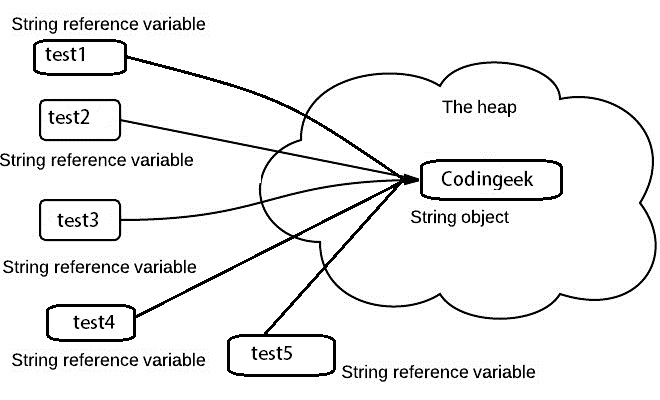Why Are Strings Immutable in Java? Secret Reasons and Advantages Discussed
Why Are Strings Immutable in Java? Secret Reasons and Advantages Discussed
Blog Article
What Is Immutable Strings and Exactly How It Functions
In the world of programming, understanding the concept of immutable strings is critical for developing secure and robust applications. Unalterable strings refer to strings that can not be modified after they are created, making certain information honesty and predictability within the code.
The Basics of Unalterable Strings
Immutable strings, as a fundamental principle in programs, are personality sequences that can not be changed once they are created. This implies that as soon as a string is appointed a worth, that value can not be changed. In languages like Python and Java, strings are immutable things, bring about various ramifications in terms of memory monitoring and data integrity.
Among the crucial benefits of unalterable strings is that they give a complacency in information manipulation. Considering that the content of an unalterable string can not be changed, it makes sure that the initial data stays undamaged, decreasing the danger of unintended changes during program implementation (Why are strings immutable in Java?). This residential property likewise simplifies debugging processes, as designers can trust that once a string is defined, its worth will certainly not be inadvertently changed
When a new string is produced based on an existing one, rather than changing the initial string, the brand-new value is stored independently. Overall, comprehending the essentials of unalterable strings is essential for grasping programs principles and maximizing code performance.
Advantages of Immutable Strings
Building upon the security and effectiveness advantages of unalterable strings, their benefits encompass improving code integrity and simplifying concurrent programs tasks. By being immutable, strings can not be customized after creation, which gets rid of the threat of unintended modifications in the data they store. This integral immutability makes certain that as soon as a string is developed, its worth stays constant throughout the program's implementation, lowering the opportunities of insects created by unexpected modifications.
Additionally, immutable strings contribute to code dependability by making it much easier to reason about the state of a program. Since strings can not be changed, programmers can trust that a string will certainly constantly hold the very same worth, streamlining debugging and maintenance efforts. This predictability brings about more reputable and secure codebases.
Implementation in Programs Languages
Within various programs languages, the unification of immutable strings is a basic element that impacts just how data is handled and controlled within code frameworks. The implementation of immutable strings varies throughout different shows languages, with each language providing its very own devices to sustain this principle.

On the other hand, find out this here languages like C and C++ do not have integrated assistance for unalterable strings. Designers in these languages must by hand apply immutability by implementing guidelines within their code to avoid straight alterations to string items.
Best Practices for Collaborating With Unalterable Strings
When handling unalterable strings in programs languages like Java and Python, sticking to best practices guarantees safe and reliable information control. Among the vital best techniques is to use StringBuilder or StringBuffer instead of straight controling strings, particularly when taking care of extensive concatenation procedures. These classes supply mutable alternatives for string control, aiding to avoid unneeded memory allocations and enhancing efficiency.
Another finest practice is to use string interpolation or format operates offered by the language rather of manual concatenation. This not only boosts readability yet likewise help in avoiding typical risks such as unintentional string adjustments. Additionally, when dealing with sensitive data such as passwords or API tricks, it is vital to stay clear of storing them as ordinary text in immutable strings. Using safe and secure storage space systems like char selections or specialized libraries for handling sensitive information helps reduce safety threats related to immutable strings.
Real-world Applications and Instances
Checking out functional applications of immutable strings in numerous markets discloses their considerable effect on information integrity and system integrity. In the additional reading healthcare industry, unalterable strings play an see here essential function in making sure the protection and discretion of patient data. By protecting against unauthorized alterations to delicate information such as clinical documents and prescriptions, unalterable strings help preserve conformity with rigorous privacy regulations like HIPAA.
Financial institutions likewise gain from the immutable nature of strings to improve the safety of client information and deal documents. Immutable strings help stop fraudulence and unapproved modifications to financial details, giving a durable protection versus cyber risks and making certain the trust and confidence of customers.

Conclusion
Best practices for functioning with immutable strings include avoiding straight modifications and using approaches that return new string things. Real-world applications of unalterable strings include information security, caching, and string control tasks.
Immutable strings refer to strings that can not be altered after they are produced, guaranteeing data honesty and predictability within the code. When a brand-new string is created based on an existing one, instead than modifying the original string, the new value is saved independently.In languages like Java and Python, strings are unalterable by default, meaning that when a string item is developed, its worth can not be changed - Why are strings immutable in Java?. Ideal practices for working with immutable strings include avoiding direct adjustments and making use of techniques that return new string things. Real-world applications of immutable strings consist of information file encryption, caching, and string manipulation jobs
Report this page